Introduction
In the competitive landscape of employment law, effective marketing is crucial for law firms aiming to connect with potential clients and establish a strong online presence. This article delves into the essential concepts and strategies that underpin successful marketing efforts in this specialized field.
From understanding the nuances of compliance and ethical considerations to harnessing digital marketing tools, firms can adopt a multifaceted approach that includes:
- Search Engine Optimization (SEO)
- Pay-Per-Click (PPC) advertising
- Content marketing
By integrating these elements, legal practitioners can not only enhance their visibility but also foster trust and engagement with their audience. As the legal marketing landscape continues to evolve, staying informed about emerging trends and best practices will be vital for navigating the complexities of client acquisition and retention.
Introduction to Employment Law Marketing: Key Concepts and Strategies
Employment law marketing encompasses the strategic promotion of legal services that address critical issues such as wrongful termination, workplace discrimination, and labor disputes. A comprehensive understanding of the prevailing legal landscape is essential for employment law marketing, which includes:
- Crafting effective promotional strategies
- Identifying specific target audiences
- Formulating messages that resonate with potential clients
As Ryan noted regarding his experience with Pure SEO, ‘We had an issue arise on our website which was related to a hack…
Pure SEO were able to give us some guidance – things like ensuring the content on particular pages were appropriate for the search algorithm.’ This emphasizes the significance of customized approaches in addressing obstacles and improving online presence.
As the environment of employment law marketing continues to change in 2024, it is increasingly essential for organizations to manage ethical considerations and comply with regulations. Such alignment not only ensures adherence to legal standards but also enhances the credibility of the organization. The resilience of enterprises in the legal sector is highlighted by the statistic that many organizations maintained stable membership figures even during the pandemic, demonstrating the significance of effective employment law marketing strategies.
By incorporating these foundational elements into their promotional approaches, businesses can create customized methods that enhance customer engagement and promote sustainable growth. Recent trends emphasize the effectiveness of innovative promotional campaigns, with successful case studies, such as the multi-brand operators who expanded their business by developing new services like yoga and massage therapy, illustrating how targeted strategies can yield measurable results in client acquisition and retention.
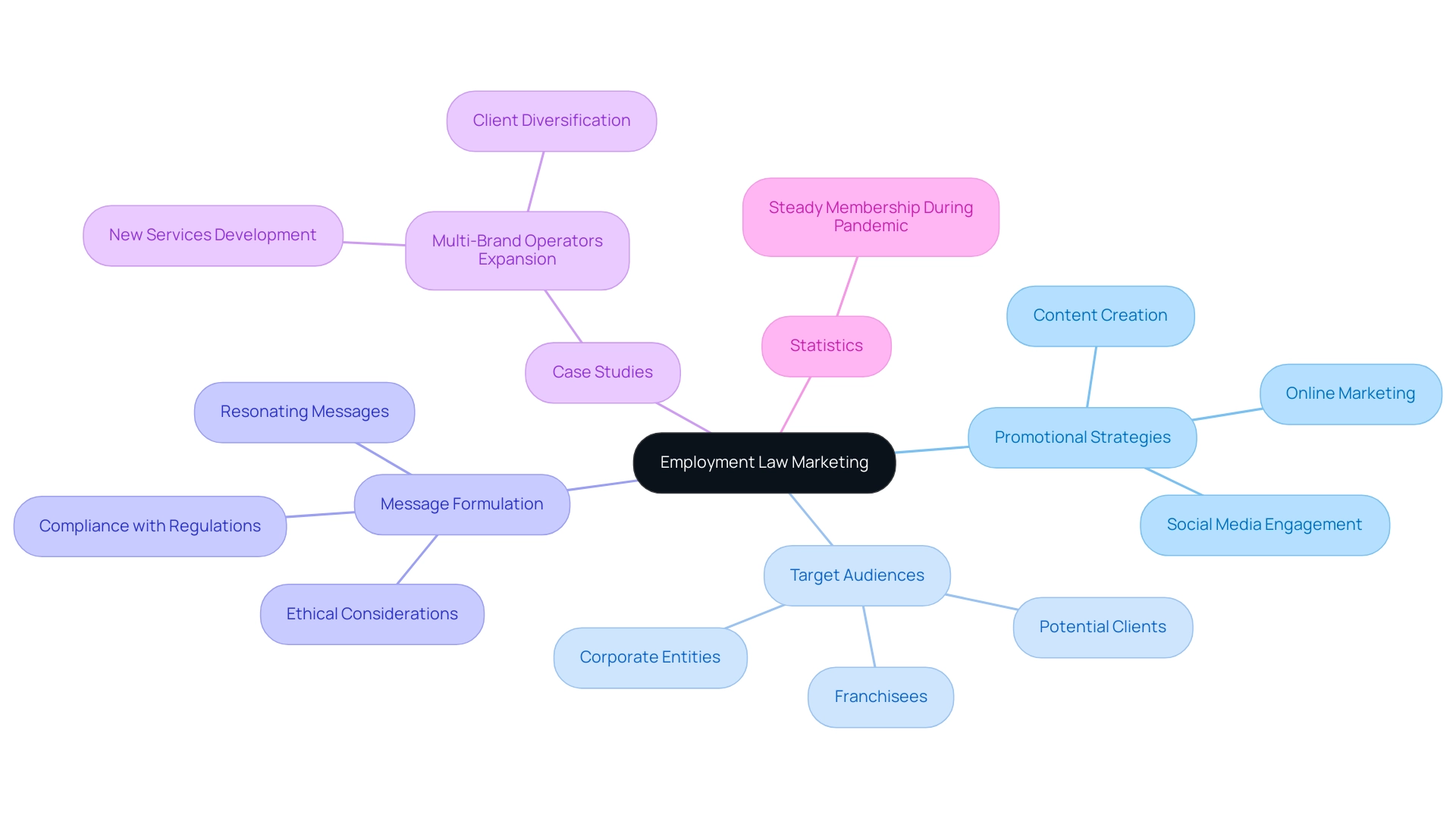
Exploring Effective Marketing Strategies for Employment Law Firms
To effectively market employment law marketing practices, a multifaceted approach is essential, encompassing:
- Search Engine Optimization (SEO)
- Pay-Per-Click (PPC) advertising
- Content marketing
- Social media engagement
SEO stands out as a critical component, significantly enhancing an organization’s visibility in search engine results. This heightened visibility is essential, as it directly affects the chances of potential clients discovering the company’s services.
Current statistics indicate that legal practices prioritizing SEO strategies are more likely to achieve higher rankings in search results, thus reaching a broader audience in 2024.
PPC advertising provides an alternative route for instant visibility, allowing legal practices to target specific demographics with precision. Successful campaigns in this realm have proven to yield substantial returns on investment, making PPC an effective strategy for legal services. Expert opinions indicate that merging PPC with SEO can enhance outreach efforts while ensuring that the company stays competitive in a crowded market.
Content marketing, including the creation of informative blog posts and resources, positions businesses as thought leaders in employment law marketing. This strategy not only builds trust with prospective customers but also enhances the firm’s online authority. Furthermore, social media platforms serve as vital tools for direct engagement with clients, fostering relationships and providing timely updates on legal developments.
In this context, the recent challenges presented by video content accessibility highlight the importance of effective translation and captioning. As noted by Chris Antunes from 3Play Media,
“Traditionally, video translation is expensive and requires high personal interaction and project management. Our goal was to streamline the workflow and make the process as scalable and cost-effective as our captioning and transcription services.”
The cost to translate a one-hour video into one language ranges from $50 to $200, underscoring the financial considerations involved. The case study ‘Tearing Down Barriers’ illustrates how Lionbridge’s human translation platform facilitated this process, allowing users to easily translate video content into multiple languages, which is crucial for reaching non-native English speakers and improving accessibility in promotional efforts. This adaptation is essential for legal organizations aiming to meet the diverse needs of their audience.
In summary, a comprehensive promotional strategy that incorporates these elements—SEO, PPC advertising, content creation, and social media engagement—can significantly enhance an employment law marketing firm’s ability to connect with potential customers and establish a robust online presence.
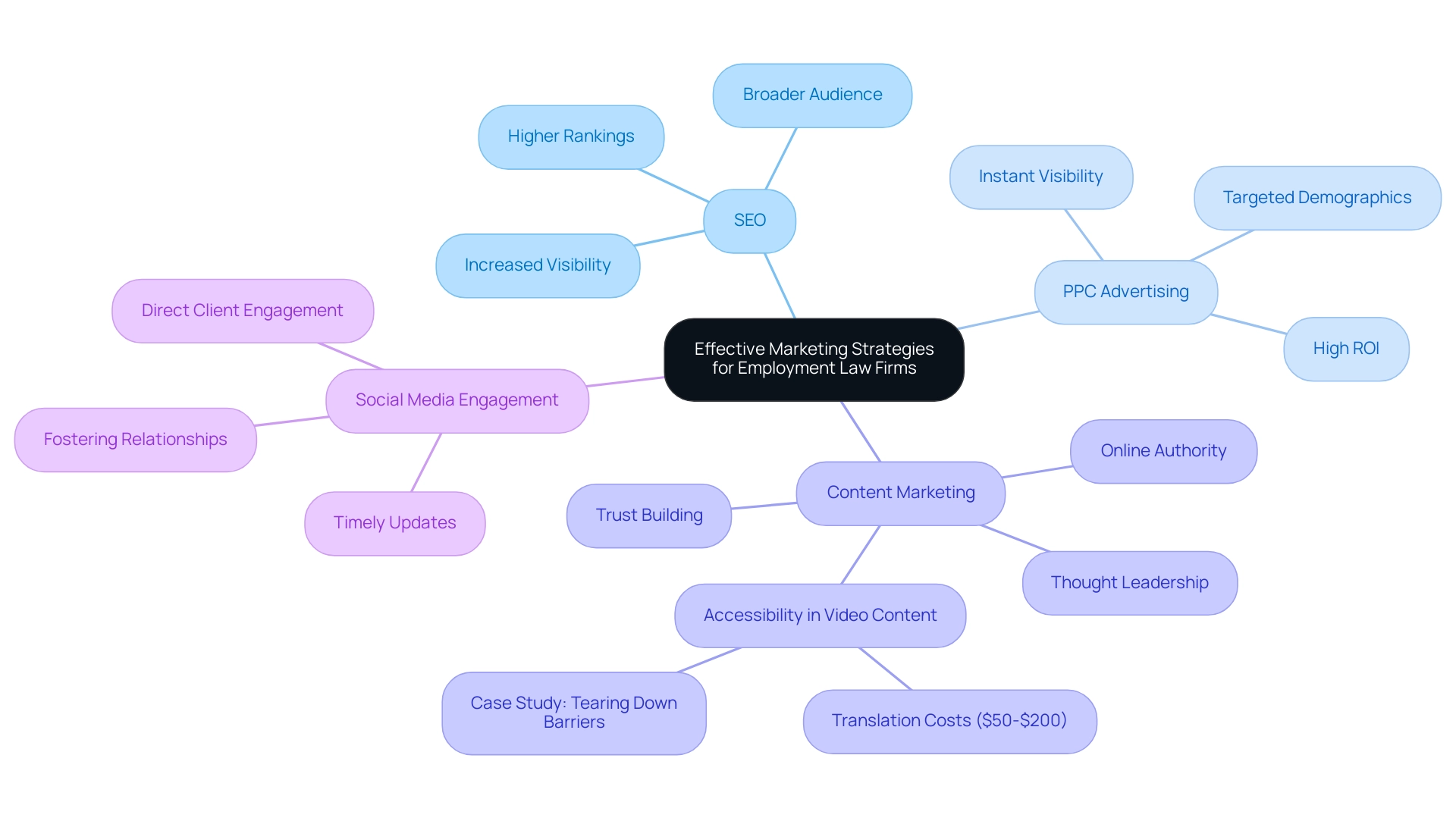
The Importance of Compliance and Ethical Considerations in Employment Law Marketing
Compliance and ethical considerations are paramount in the realm of employment law marketing. Legal practitioners must navigate the regulations established by state bar associations and the American Bar Association to ensure their advertising practices align with legal standards. This involves refraining from making misleading claims, safeguarding client confidentiality, and upholding professionalism in all promotional communications.
Given the sensitive nature of employment-related issues, promotional campaigns should be crafted with empathy and integrity. For instance, the Wylie Independent School District (Wylie ISD) has successfully utilized tools like Servicefinder to enhance their strategic decision-making and ensure compliance with state regulations. As noted by Wylie ISD, ‘Servicefinder provides Wylie ISD Administration the details required to make strategic decisions, show accountability to the public and be in compliance with state regulations.’
This demonstrates the effectiveness of accountable practices. Additionally, Sigma’s impressive achievement of hiring and training over 400 annotators in 8 languages within just 6 weeks highlights the importance of operational efficiency in maintaining compliance. By prioritizing compliance and ethical conduct, employment law marketing can foster trust with their clientele and strengthen their reputation within the legal community.
This approach not only aligns with current compliance statistics in legal advertising but also reflects the evolving expectations of ethical promotion practices in 2024, particularly as seen in the improved accountability and operational efficiency resulting from Wylie ISD’s use of Servicefinder.
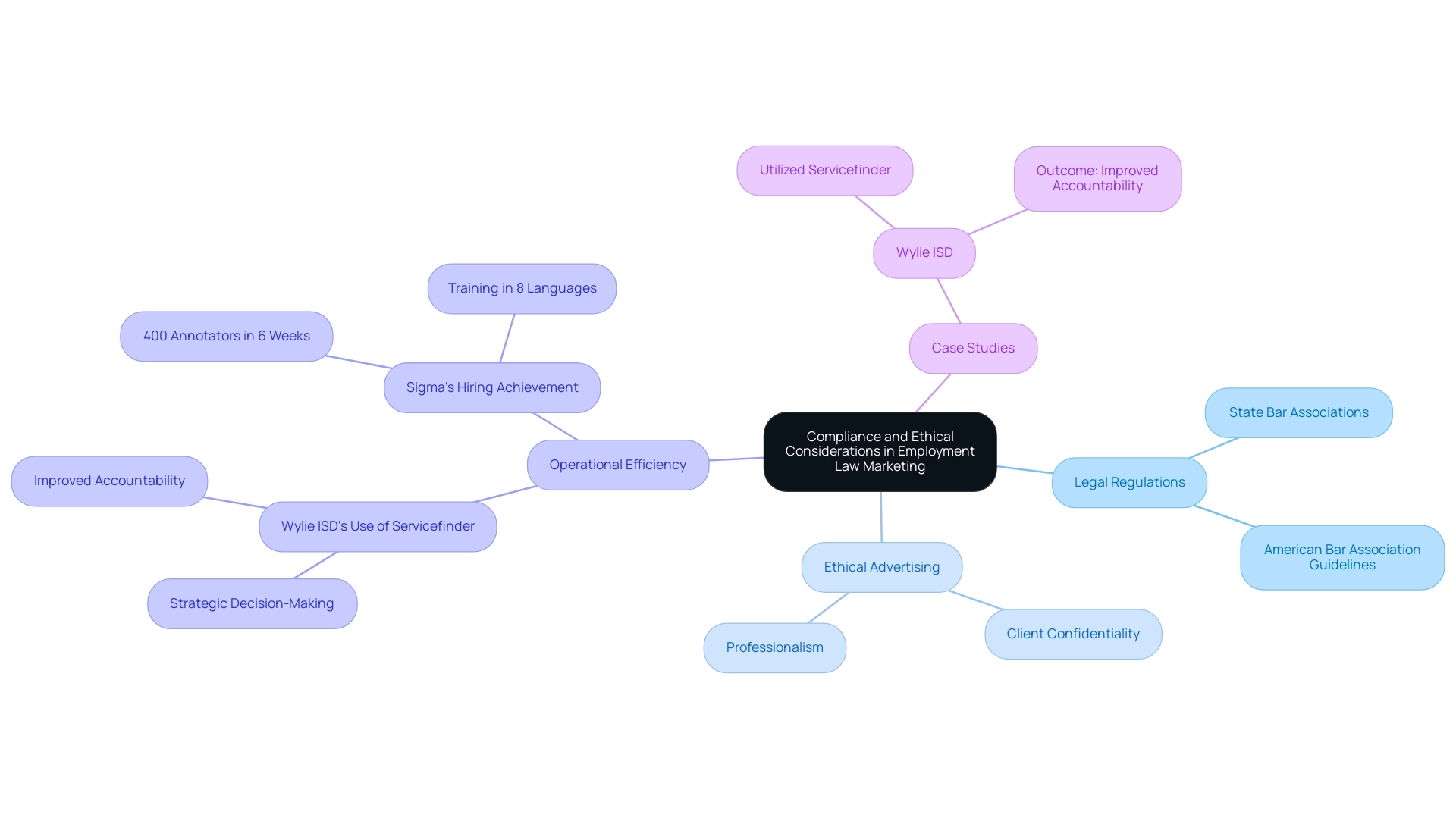
Leveraging Digital Marketing Tools for Employment Law Firms
Digital promotional tools are vital for employment law marketing practices looking for innovative ways to engage with potential customers. For instance, Google Analytics serves as a powerful resource, enabling businesses to monitor website performance and user behavior, which in turn informs data-driven strategic decisions. Email marketing platforms are equally significant, facilitating direct communication with customers by delivering updates and valuable resources efficiently.
Moreover, social media management tools enable companies to maintain a consistent online presence on platforms such as LinkedIn and Facebook, enhancing visibility and engagement. Customer relationship management (CRM) systems play a crucial role as well, assisting businesses in managing customer interactions effectively to enhance service delivery. Notably, a partnership with MyCloudCrew has proven transformative for agencies, as highlighted by Operations Manager Sarah J., who stated,
Partnering with My Cloud Crew has been a game-changer for our agency…
The increase in efficiency and customer satisfaction has exceeded our expectations. In fact, MyCloudCrew’s Virtual Assistants have optimized scheduling, reducing missed appointments by 50%, showcasing a tangible benefit of leveraging digital tools. Furthermore, case studies from the North American Quitline Consortium show that call volumes to quitline services are related to advertising levels, emphasizing how effective promotional strategies can drive engagement.
By effectively utilizing these digital tools, employment law marketing can significantly improve promotional efforts and develop stronger connections with customers, ultimately leading to enhanced operational results.
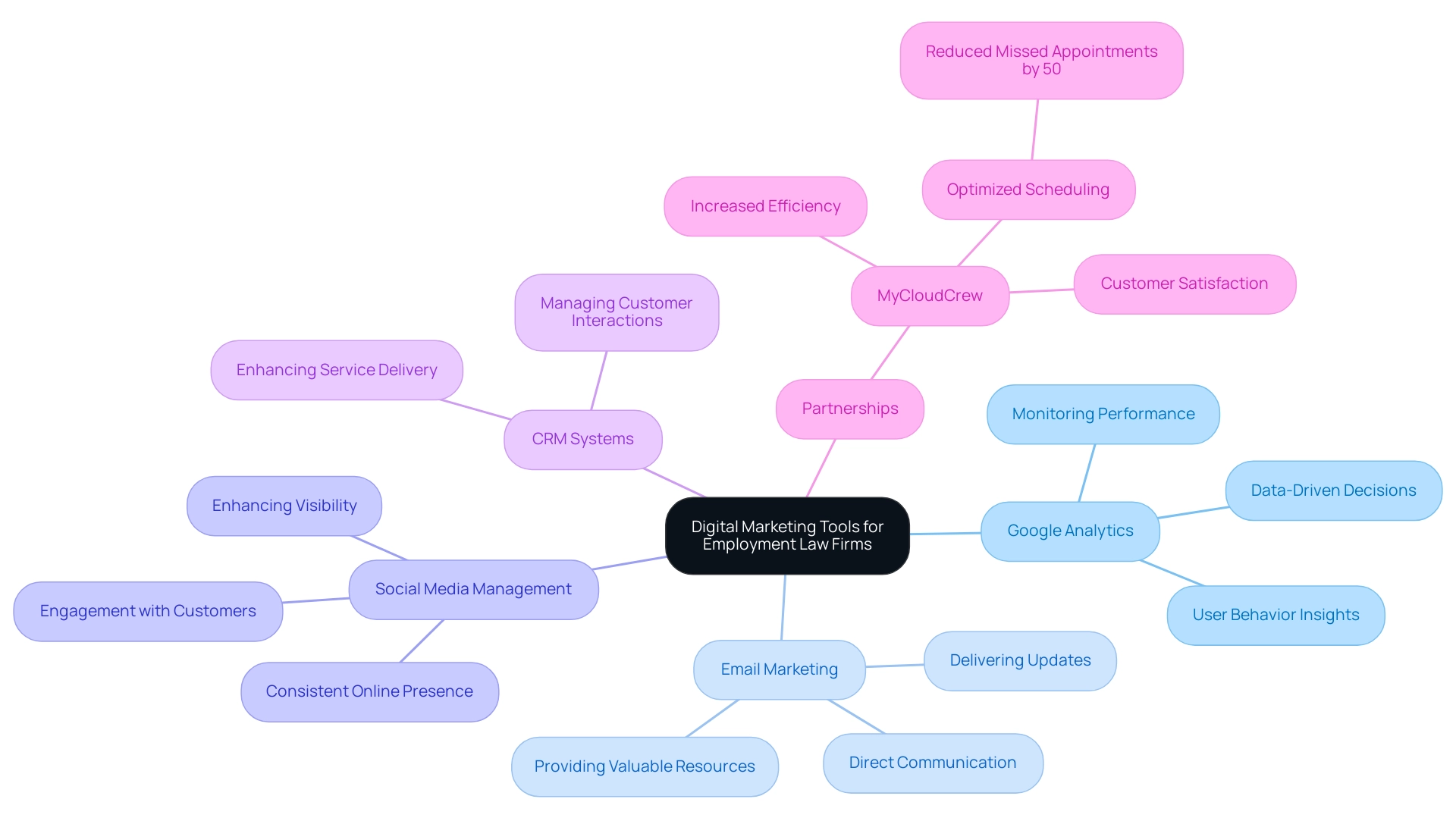
Measuring Success in Employment Law Marketing Campaigns
To evaluate effectiveness, measuring success in employment law marketing campaigns requires careful tracking of various key performance indicators (KPIs). Essential metrics include:
- Website traffic
- Conversion rates
- Customer acquisition costs
- Return on investment (ROI)
As Duncan Elder, a content writer at MailerLite, notes, “Building a strategy based on data helps in understanding what truly works for your audience.”
Employing tools such as Google Analytics can provide essential insights into user behavior on a company’s website, assisting in recognizing which strategies appeal to prospective customers. Additionally, statistics reveal that agencies have a bounce rate of 0.75%, while the Travel and Transportation sector boasts an open rate of 40.31% and a click rate of 1.98%. These metrics suggest significant potential for improvement in customer engagement.
Customer Relationship Management (CRM) systems are invaluable for tracking customer interactions and outcomes, enabling companies to analyze their engagement efforts comprehensively. Consistently assessing these metrics cultivates a setting where companies can identify effective strategies while also acknowledging areas that need enhancement. By embracing a data-driven approach, employment law firms can continuously refine their employment law marketing initiatives, ensuring that they align with the evolving needs of their clients and leverage the latest trends in legal marketing.
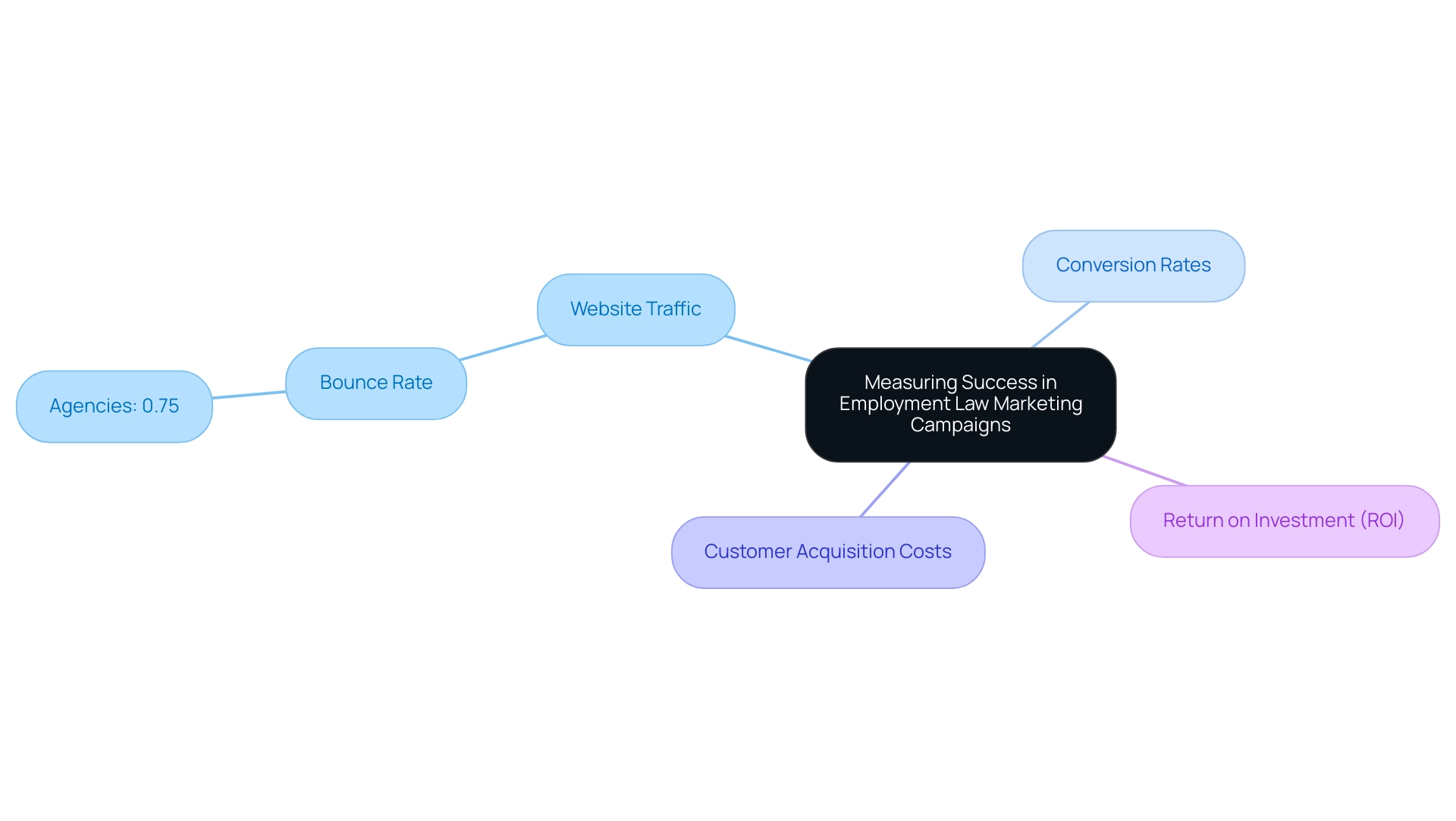
Conclusion
A strategic approach to marketing in employment law is essential for firms aiming to thrive in a competitive landscape. By integrating key components such as:
- Search Engine Optimization (SEO)
- Pay-Per-Click (PPC) advertising
- Content marketing
- Social media engagement
firms can enhance their visibility and effectively connect with potential clients. Each of these strategies plays a critical role in not only attracting clients but also establishing the firm’s authority and credibility in the legal community.
Moreover, compliance and ethical considerations must be at the forefront of any marketing campaign. Adhering to the guidelines established by relevant regulatory bodies not only mitigates risks but also fosters trust with clients. As the legal landscape continues to evolve, maintaining a commitment to ethical marketing practices will be crucial for building a reputable brand.
The utilization of digital marketing tools further amplifies the effectiveness of employment law marketing efforts. By leveraging:
- Analytics
- Email marketing
- CRM systems
firms can gain valuable insights into client behavior and preferences, allowing for more targeted and effective communication. Measuring success through key performance indicators ensures that firms can continually refine their strategies to meet the changing demands of their audience.
In conclusion, a comprehensive and ethical marketing strategy that embraces innovative digital tools is vital for employment law firms seeking to enhance their client acquisition and retention efforts. By staying informed of industry trends and prioritizing compliance, firms can cultivate a strong online presence that resonates with prospective clients and solidifies their position in the legal market.

